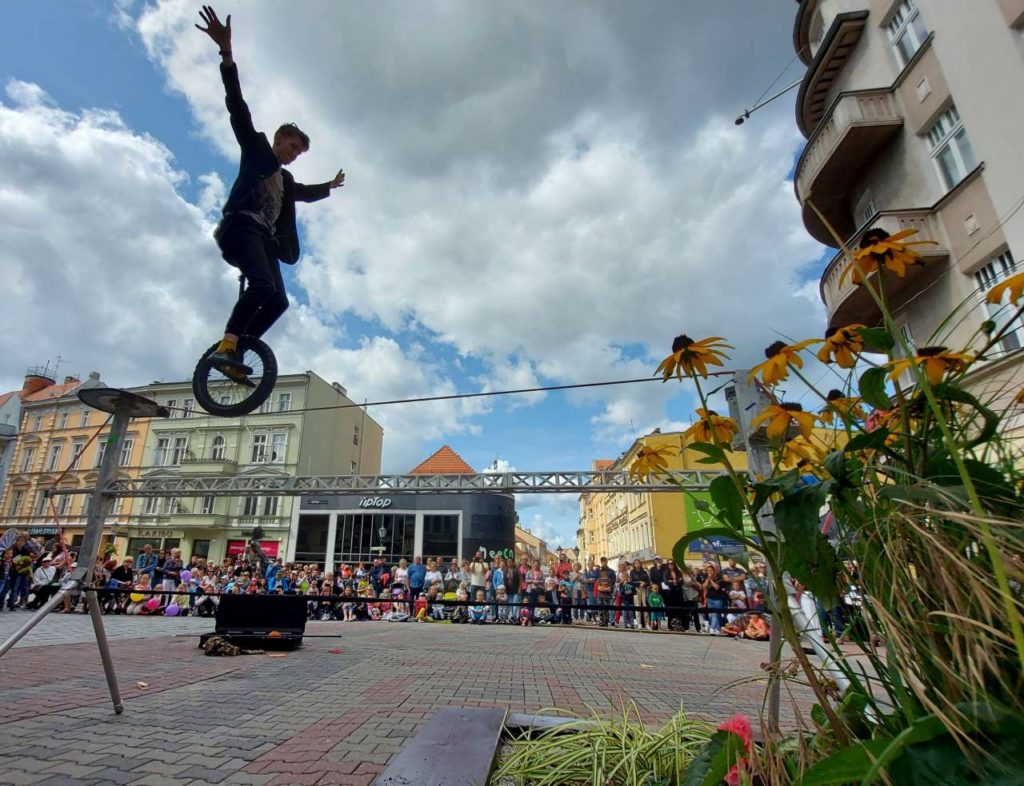
Sam Goodburn started as a unicyclist and won his first freestyle championship title at the age of 15. Over the years, he has mastered his signature act – unicycling across a tightrope, among juggling and cookie eating techniques that he approaches like a new circus discipline. In this interview, Sam shares his story of becoming a performer and following his dream of making tricks less risky and more crispy.
I want people to feel like they know me in my show and that my comedy comes from connecting with me and how I am genuinely feeling in that moment and so if my life is going well, I am happy with myself and I don’t feel too arrogant then that reflects into my show and the audience can feel that and get a better show, and also I end up having more fun!
But yeah, my character is me, just exaggerated and in a state of excitement to be in front of a big group of people performatively.
Sam Goodburn
Circus props that you can eat
Hello Sam, how are you? Have you eaten any good cookies today?
Good afternoon. Or good whatever-time-of-day-you-are-reading-this. I am really well. I am sitting at the kitchen table of an Airbnb in Helsinki, Finland and have a packet of ‘Josefina’ cookies I found at a local supermarket to use as show props in Finland. It is always good to sample them pre-performance and so.. the packet is now half empty.
How come you are so thin despite eating so many cookies?! Do you get many complaints from people who slipped up on their strict diet after watching your show? And, which country has the best cookies?
BREAKING NEWS cookies don’t make you fat. I have been conducting a decade long study on cookies and the proof is in the pudding (that’s a British phrase that totally fits) and cookies help you be tall and skinny.
Honestly though I just have one of those annoying body types that can eat whatever and always looks the same, I can’t build muscle easily either though – which I am also secretly pleased about cause I think my body looks funny, awkward and British.
The world’s best biscuits are… it’s tough as every country has their own style. I will have to say Britain but only because I grew up eating them and it is nostalgic. I don’t want to compliment Britain too much though after Brexit making my performing life so much harder. Grr.
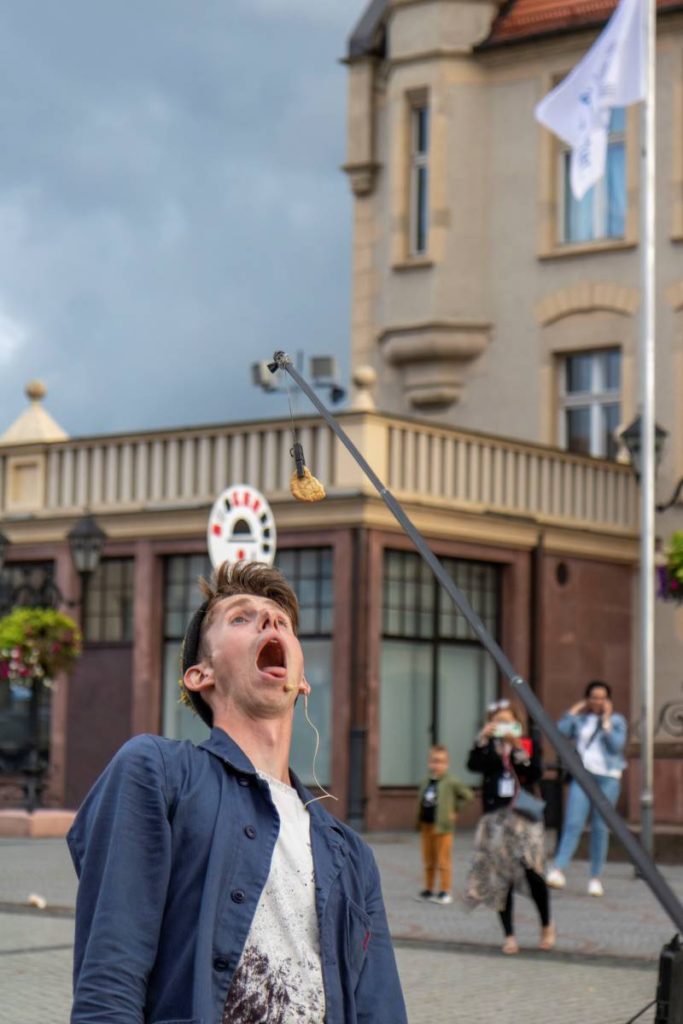
Who is Sam Goodburn?
Sam Goodburn is me. I am Sam Goodburn. I am unicyclist, juggler and tightrope walker from England however, I am trying my hardest to do all those things less in shows and instead focus on character comedy and eating cookies. I was booked for my first street festival when I was 17 and I am now 27 and since then I have performed as a clown in tented circus, in late night cabarets, on cruise ships in Australia, in my own solo theatre show at the Edinburgh Fringe Festival and much more, it’s been fun.
You won a freestyle unicycle championship for the first time over ten years ago, so if I understand correctly, you treated it as a sport at the beginning. How did it transform into a circus show?
When I was 11.. or maybe 12.. I learnt to unicycle after being inspired by seeing a girl my age ride one at a local fair. I later went on to perform at Wembley Arena to 14,000 people doing a duo unicycle act with her older brother, Lucas. Initially, I didn’t know what was possible on a unicycle and after I learnt to unicycle forwards, backwards and idle in one spot I thought I had mastered it. But I was very wrong.
The internet wasn’t so dominating in everyone’s lives then so I couldn’t so easily see what the best unicyclists in the world were up to but instead I used yahoo search engine to try to find out more about unicycling in my area. Bizarrely, there was a national unicycle convention and even more bizarrely it was next weekend… 20 minutes drive away from my house. So my dad took me over each day and I met my first other unicyclists and saw what tricks people were doing in the UK and also watched the championships. I was massively inspired and decided on a style of unicycling I wanted to train which is called freestyle and within a couple of years I learnt everything I remembered seeing from that event.
Fast forward to age 15 and I won the freestyle championships for the first time. Fast forward again to my 18th birthday and I am on a plane for the first time in my life heading to Italy to the World Unicycle Convention. I arrived full of excitement and anticipation – it lasts two weeks and all the best unicyclists of all different styles attend and compete. If my life were a movie then this is where I would win the world championships in every category and win the heart of prettiest girl unicyclist. Instead I decided not to compete in the freestyle competition and just to watch.
I came to the life altering conclusion that I no longer cared if I could do the most difficult tricks like the people here (in the competition) because they weren’t necessarily the most entertaining. From this moment on I decided the audience’s perception was what I cared about. I wanted to be a performer.
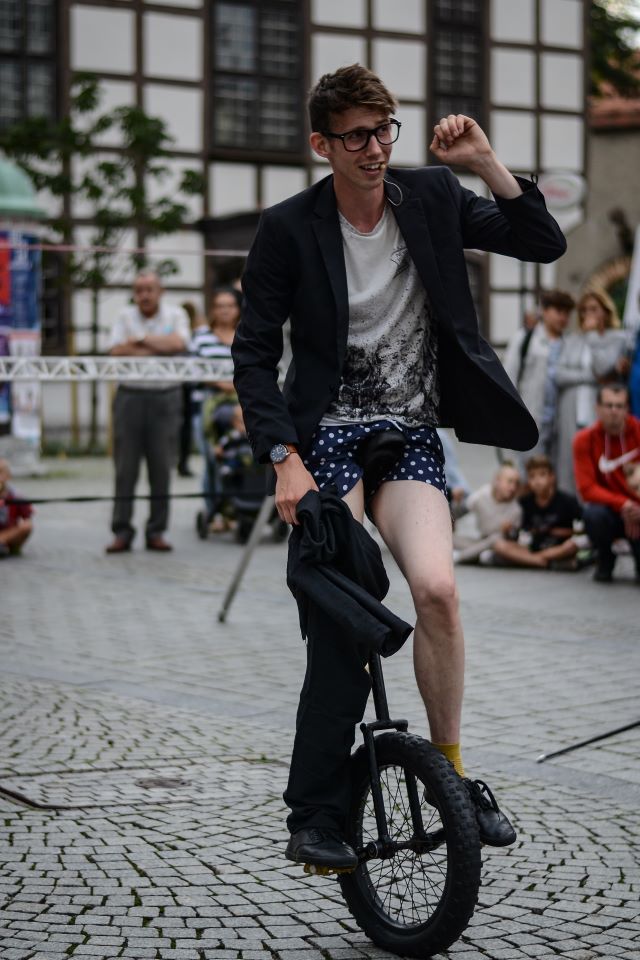
You started at a young age. What did your childhood look like? Were you obsessed with your unicycle from the moment you first tried it or was it one of many of your hobbies back then?
I got a little carried away on question number 4 so I think you get the idea of my obsession with unicycling as a child. I also really enjoyed filming and editing videos – not always unicycling, but silly things. I’ve always found when I have a creative project idea I get really obsessed with it, not so much with anything academic.
You got your first unicycle from your dad. Was your family supportive of your plans? What tips do you have for parents whose kids want to perform?
I didn’t realise initially when I started to learn to unicycle but my dad could ride one, he had made one when he was 14 after seeing one in a circus on the TV. My parents were really supportive but in a way which didn’t put any pressure on me. They never actively pushed me to do circus or actively tried to get me to do something more serious. They just supported whatever I wanted to do, if I asked to go to an event they would take me if they could afford too.
My advice is.. that at a certain age kids like to rebel from what their parents want them to do, if you’re too interested in their performance then they’ll probably have a phase where they don’t want to do it anymore. But if you let it be their thing then they can decide how passionate they are about themselves, and if they love it then they really will love it.
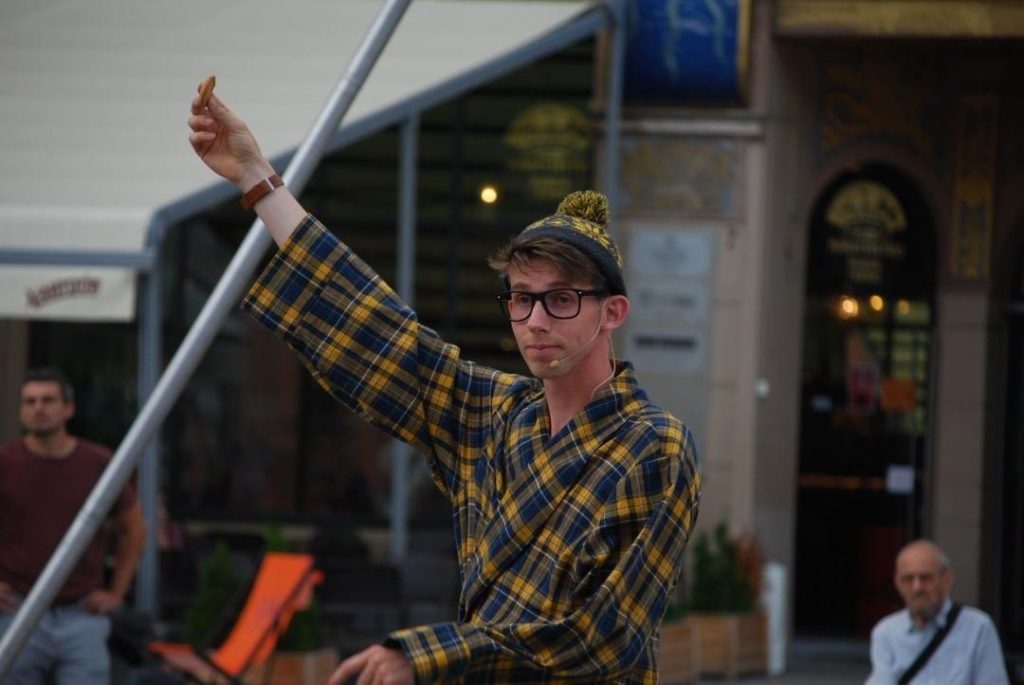
My character is me
There is a lot of comedy in your show. How would you describe yourself in your private life? Is it easy to break character?
I usually like to have a lot of time to myself when I’m not performing. I’ve always felt a bit awkward socializing with groups of people that have just watched my show because I’d rather not always be the centre of attention or be complimented on my show in a social setting.
I want people to feel like they know me in my show and that my comedy comes from connecting with me and how I am genuinely feeling in that moment and so if my life is going well, I am happy with myself and I don’t feel too arrogant then that reflects into my show and the audience can feel that and get a better show, and also I end up having more fun!
But yeah, my character is me, just exaggerated and in a state of excitement to be in front of a big group of people performatively.
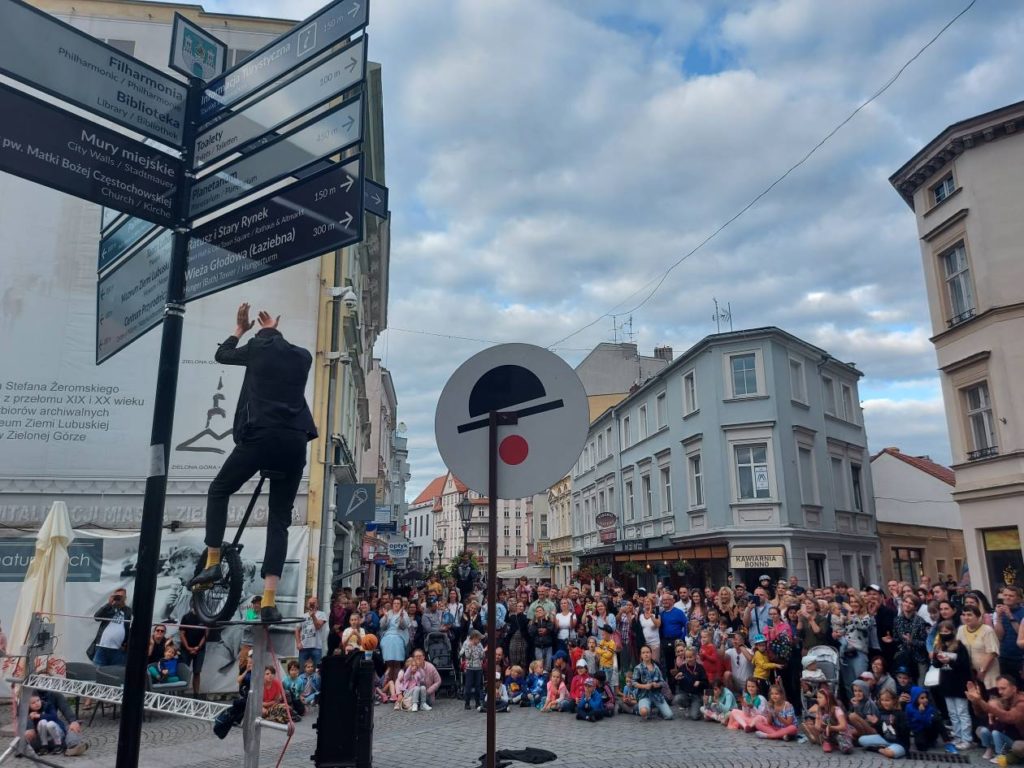
My life is built around change and adventure
What does your typical day look like? After so many years of juggling and unicycling, do you still need to train your routines regularly?
I don’t have a typical day. Or ever really get into a routine. My life is so different from day to day. Sometimes I live out of my suitcase, sometimes I’m on tour with a circus or sleeping in the cabin of a cruise ship and sometimes I am in my van. Nowhere is fixed, I haven’t lived in one place since I left my parents home at 19. I love that my life is built around change and adventure, one day I’ll slow down, but.. not yet.
The most intense phase of my training was when I was teenager – I remember trying to do 4 hours on a weekday after school, 10 hours on a Saturday and 2 hours on a Sunday. I kept it up for quite a long time but when I began to perform full time there wasn’t the time to do it and I also lost some of my motivation when
I realised the audience’s appreciation of your show wasn’t directly linked to how hard your tricks were. Yes, hard tricks are a factor but now I realise they are only a small part of what makes a good performer.
I decided I would only train when I wanted to and now I never make myself do a certain amount of training, if I go to train and after 5 minutes I’m not feeling motivated, I pack up and go home (wherever home is) or even if I don’t train for a month then that’s completely okay. Often I will have a silly idea for a show and find myself just training a new cookie trick for hours rather than juggling or unicycling, because that is what is exciting me at that moment.
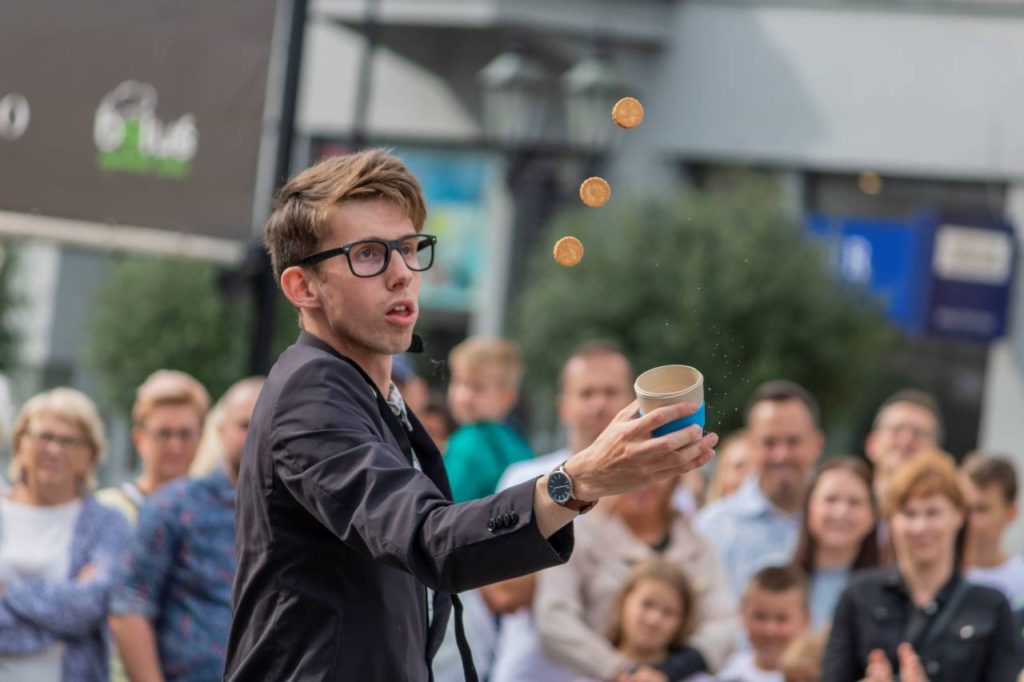
What is the most difficult stunt you have learned or are proud of and what is still on your list of skills to master?
My toaster trick! In 2017 I made a one hour solo show for theatres. I was only 23 and it was an immense challenge where I felt a lot of pressure. Like my street show I tried to use juggling props as little as possible and instead created lots of tricks with breakfast items to fit into the narrative. I had a mad idea that I wanted to get a toaster to fire toast 3x higher than normal and be able to throw a knife across the stage and pin it to a chopping board in the split second before it could fall back into the toaster.
I was not a knife thrower.
I had to teach myself knife throwing, get this toaster made and train for SO long. It was ridiculous and probably meant the rest of the show wasn’t as good as it could have been because of all the time I spent on this one trick. I got it, and I performed it in 26 shows over 27 days at the 2017 Edinburgh Fringe. I never did the show again, or any knife throwing but one day I will put the trick into a show again and bring back my knife throwing skills!!
Still to master… I need to learn more weird awkward comedies and original audience engagement techniques. Plan to do it: Do more shows, try more silly ideas.
You are self-taught and during your show, you explain that you don’t do your unicycle across a tightrope stunt like other performers because you didn’t realise that there was an easier way to do it. How do you learn new tricks these days?
As I said earlier when I first started I learnt most of my tricks from a memory of one event where I saw a bunch of unicyclists.
What I think is great about figuring out how to do tricks you’ve seen yourself, particularly with a balance based skill is that you naturally learn lots of variations of it whilst you work it out and I think you have a much better understanding of the trick. This definitely gave me a good foundation for when I started to come up with my own tricks.
Sometimes I would later discover other people also do the same tricks I thought I had made up, but not knowing at the time gave me an extra surge of motivation that I was working on something original and so I would train it a lot! So it had its uses not doing my research.
Even the tricks I do now that I haven’t seen anyone do I’m sure other people will one day, the same as me come up with them on their own.
I have had people copy things I’ve done that I know have seen me perform and do it a bit too similarly for comfort. But I can’t do much about it and they won’t have the same sense of satisfaction and inspiration I did when I was refining it.
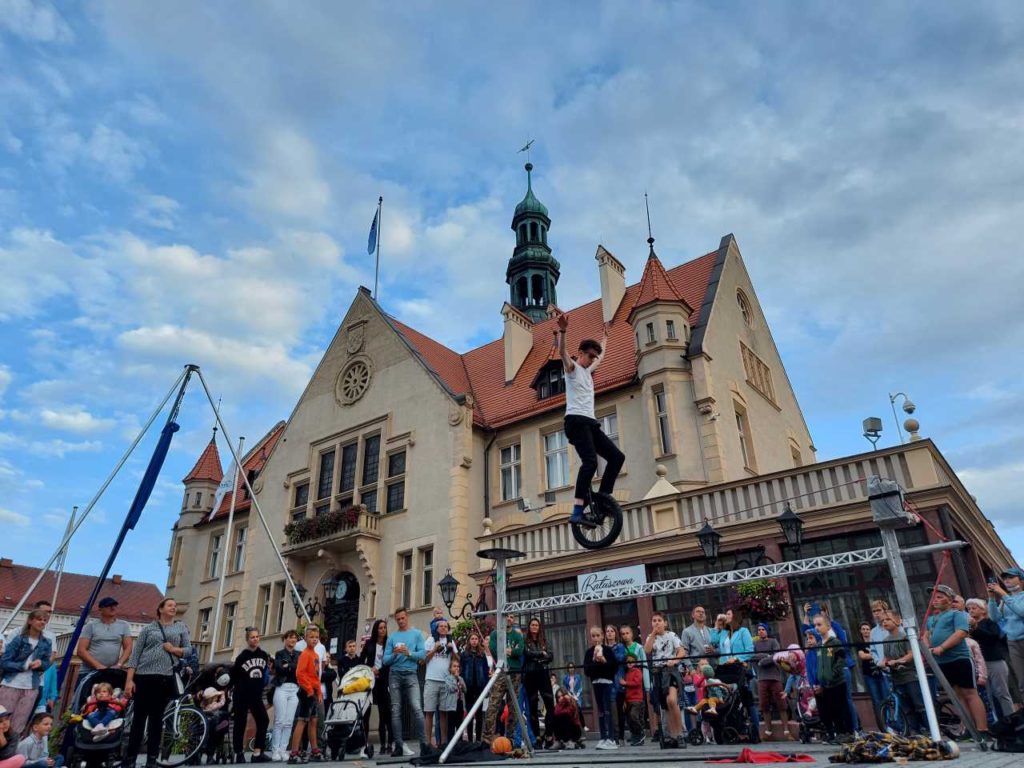
At BuskerBus, your performed different versions of your “Sam Goodburn Wire Attire” street show, so I know you don’t stick into one scenario. Can you tell me more about your shows? What’s your process of creating them? How do you come up with your ideas, and do you modify them often?
At 19 years old I did a big tented circus tour for 8 months, at first just doing a unicycle act but then 2 months in they suddenly lost their clown and asked me to fill in. I had absolutely no time to rehearse any clown gags and they didn’t want me to copy the last guy’s stuff. I spent the precious few hours of preparation sitting in a McDonald’s next door using their Wifi to watch as many clown acts on youtube as I could. The show started and I improvised 4 clown gags, completely clueless to what would work. This turned out to be an incredible way to write material, find my character, find the relationship with the audience, find the comic timing, everything. We did 12-14 shows a week, and I never tried stuff without an audience.
You can very rarely get away with creating acts like this, the street is also a good place for it, but not many other places, but it definitely taught me some valuable lessons about modifying material from the feeling you get from an audience and to always keep trying new little things, just to see if it could be brilliant.. or complete sh*t.
How do you balance artistry, storytelling and technical skills? How important is narrative in your shows?
This is a really interesting question that I haven’t figured out the answer to yet but I’ve thought about it a lot. That solo circus theatre show I tried to do when I was 23 has a full story to it, as if it was a play. I thought that I wanted every trick to make exact sense and serve the plot, for example, I did a juggling routine with two mobile phones because they were both ringing and I was trying to stop them from waking up my off stage fictional girlfriend that you never meet. Looking back I took the realism too far and the commitment to storytelling got in the way of the audience enjoying the tricks. I presented them as if they had to make sense and people got sucked into a play made on a low budget by one performer.. compared with most big budget big cast plays people are used to watching it just didn’t compete.
Fraser Hooper is a brilliant street theatre clown who talks about painting a picture of where you are. Which means creating a setting for your playing to take place. Where are you? I think more and more that this is a good foundation for a show. Decide where you are but don’t limit yourself to what you can do there, just find ways to fit it into that world in your own unique way.
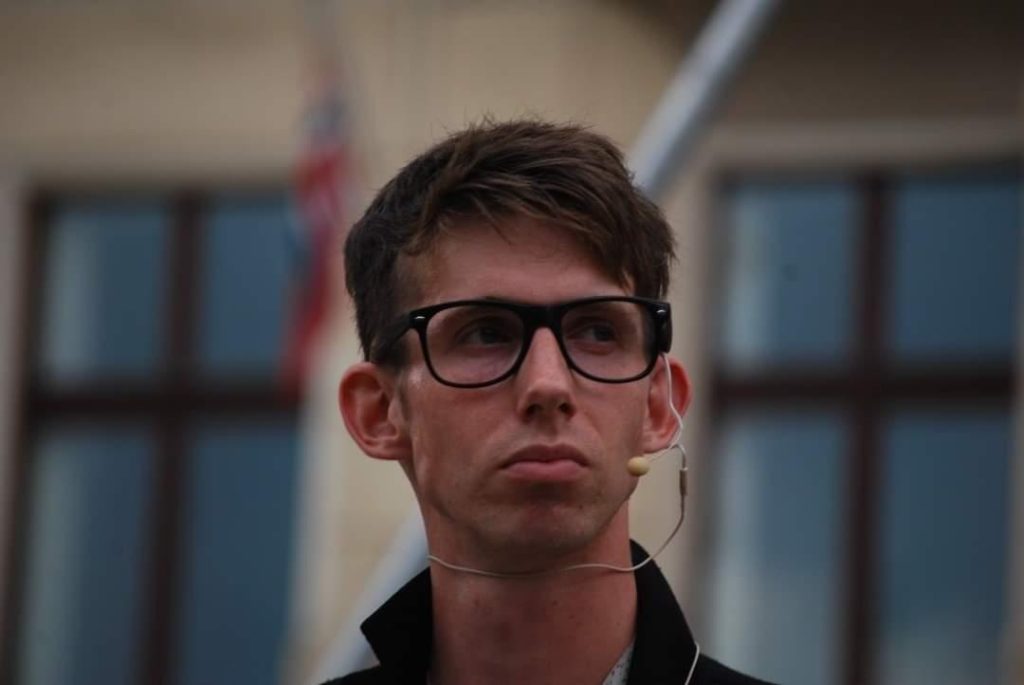
One performer told me that buskers rarely juggle on the street with more than three balls because the audience doesn’t appreciate high technical skills, and they see no difference between 3 or 5 balls. Your show is packed with tricks. Do you decide ad hoc on the street if you would do less or more difficult ones?
My opinion:
The audience does appreciate a higher technical skill level. It is just not relative to how hard it is. You could entertain a crowd with one juggling ball, with your personality, humour and how you write the routine. But if you did a similarly structured act with 3 balls would they be more impressed? Maybe. It depends if you have the 3 ball version of the technique nailed enough that you can play it with the same level of personality, humour and ease.
I think it’s the same with 4 balls. 5 is a little different because you have to look up which if your routine is too long naturally will mean you are less connected with the audience because you aren’t looking at them as much.
Okay but if you take my usual finale trick of unicycling across a tightrope. It would be much much easier for me to do with the tyre off. The audience would have a similar experience watching me do the trick. Perhaps some will think it’s easier because I don’t have a tyre on but it’s only slightly more impressive to the general public to do the trick the way I do it. Why do I do it? 1. I know the trick really well so I can still have all the flavours of personality so I don’t need to make it easier for me. 2. It would be a pain to carry two unicycles and if I only had one without a tyre I couldn’t do any other unicycle routines. 3. Booked gigs often are who you know not what you know and if your peers are impressed they’ll talk about you positively and festival bookers often have an understanding of technique and will be impressed too.
And yes! I do decide ad hoc if I do harder or easier tricks. Sometimes I just want to, and if I’m enjoying myself and present the audience will feel that and be on board. Other times I can tell the audience would disengage if I bombarded them with too many tricks that require too much concentration. So I don’t do them!
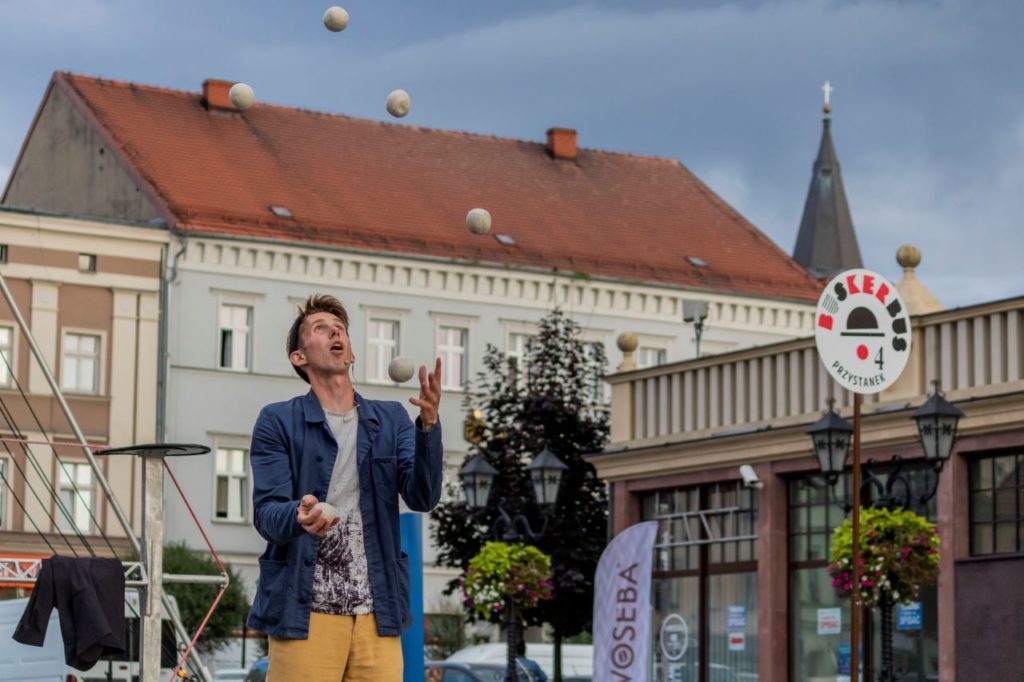
Are there any tricks or jokes that you believed were exciting, but you skipped them because the audience didn’t react to them as you expected?
Hmm… I spent a while learning to juggle 5 clubs on a unicycle. Which the audience do like… but definitely not enough to justify carrying around 5 clubs. If I had them anyway I’d probably perform it but I just never carry clubs any more. I’m quicker to cut tricks that take up more space in a suitcase. If the prop is small I’ll usually keep playing with it and trying it in shows until I find a way to make it work. Most things don’t work to start with.
I did, I think, 3 shows where I silently got a man to brush his teeth on the street. Which I really thought would be funny. Even writing it now I still think it sounds funny. But I think generally just getting audience members to do things with their mouths is a bit gross in a way that didn’t unite the crowd. The audience found it inwardly funny, but did not laugh. Me too though.
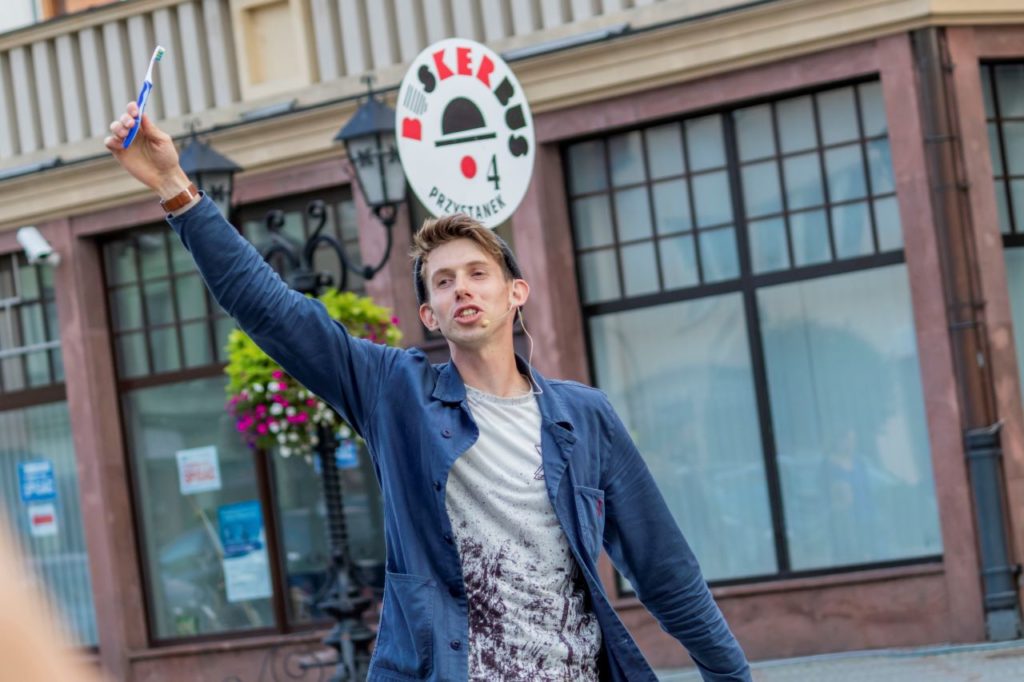
Always trialling things
You have performed worldwide. Do you adapt your show depending on where you perform because the audience finds different things funny or entertaining?
I find it super interesting how universal silent comedy is. I have performed the same physical comedy unicycle routine to an all girls primary school (ages 5-11), an elderly care home, an over 18 only adult cabaret in Australia and on a street in Hong Kong. All have seemed to enjoy it on a similar level. Silent comedy can be a powerful tool and even when I’m doing a talking show I like to have moments without talking, there’s a focus that draws everyone into your world that just isn’t the same when you’re speaking.
I am always adapting my show though whether I’m in the UK or in a new place I’ve never made a “perfect” routine or even close so it’s a constant evolution where I’m trialling things. If I do two shows in a row that are exactly the same down to the exact facial expressions then I’m probably not happy.
On the flipside to this question though, if I’m busking on a regular street in a new place – whether that’s another country or just a new spot at the same time. I have to adapt the show a lot to make it work and feel confident in that new setting. I’ve never once arrived, done my first show in a new place, felt really comfortable and had a fantastic show. More likely I spend a couple of days thinking the spot doesn’t work or the people in the town don’t like me, by the end of the week though I’m usually having a lovely time doing fun decent shows.
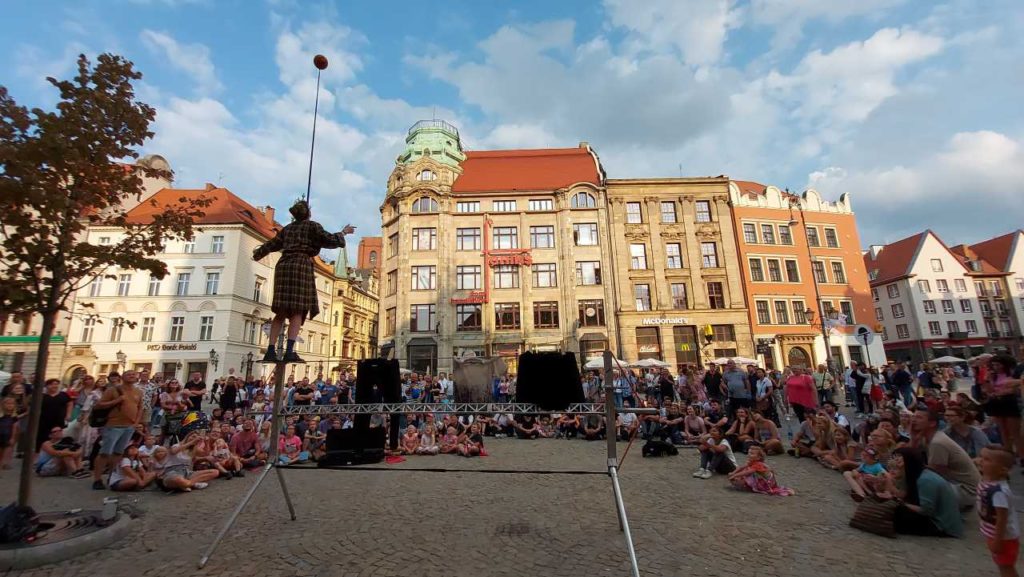
What have been the milestones or highlights in your life as a performer?
2017 I did a project called Performers Without Borders. There was one show where we went to a children’s hospital waiting room in Nicaragua. We moved all of the chairs to sides of the room and one of our little team of performers would always be on the music ready to pause it if a nurse had to come in to call through the next family. That was far the most rewarding show of my life.
2018 I did my first street show on the royal mile during the Edinburgh Festival. Looking out during my finale trick, seeing almost every face on that crazy busy street looking at me and smiling. That show gave me such a beautiful adrenaline rush.
2017-22 I toured on and off with NoFit State Circus which is the biggest contemporary circus in the UK and has a team of 40 people. I had one of the main parts in the show and as well as it being an incredible experience where we went all round the world (we even shipped the entire tent to Melbourne, Australia) it also made me realise that it didn’t feel much different to doing smaller show.
It isn’t important how big the show or the festival is you’re doing but how much you enjoy each performance, the connection with the audience and the adventures it takes you on.
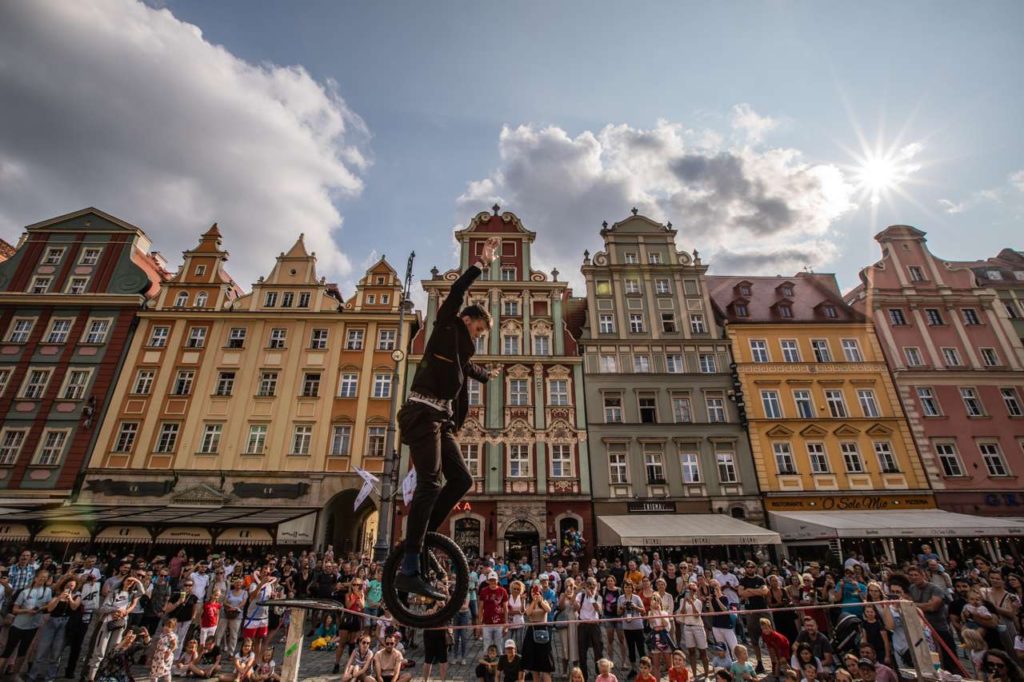
You have performed in big tents, galas, cruises, on the street, and the list goes on. What experience shaped you as a performer the most?
Oh yeah, definitely the street and I’m not just saying this because it’s a busking interview. If people don’t like what you’re doing on the street they walk away or don’t stop to start with. You can see everyone’s faces, in high definition daylight responding exactly to what you’re doing. We are experts at reading each other’s body language and facial expressions, consciously and subconsciously trying material in front of a sea of people that didn’t really want to stop because they’re out shopping or could be getting an earlier bus home helps you develop a connection with an audience like no other performance setting.
It works the other way round too, audiences, people are experts at reading your emotions so no matter how hard you’re faking a smile or a laugh the audience can tell if it’s genuine or not. Not all my shows go well, I can’t always get my head into it, but when it does it can become a real conversation between you and the audience that should be unique to that show.
What I also love about it is that the best preparation I find to do a show is to be in a good place mentally, feel happy, humble and confident. Which also makes you feel better in everyday life. Ahh I love performing.
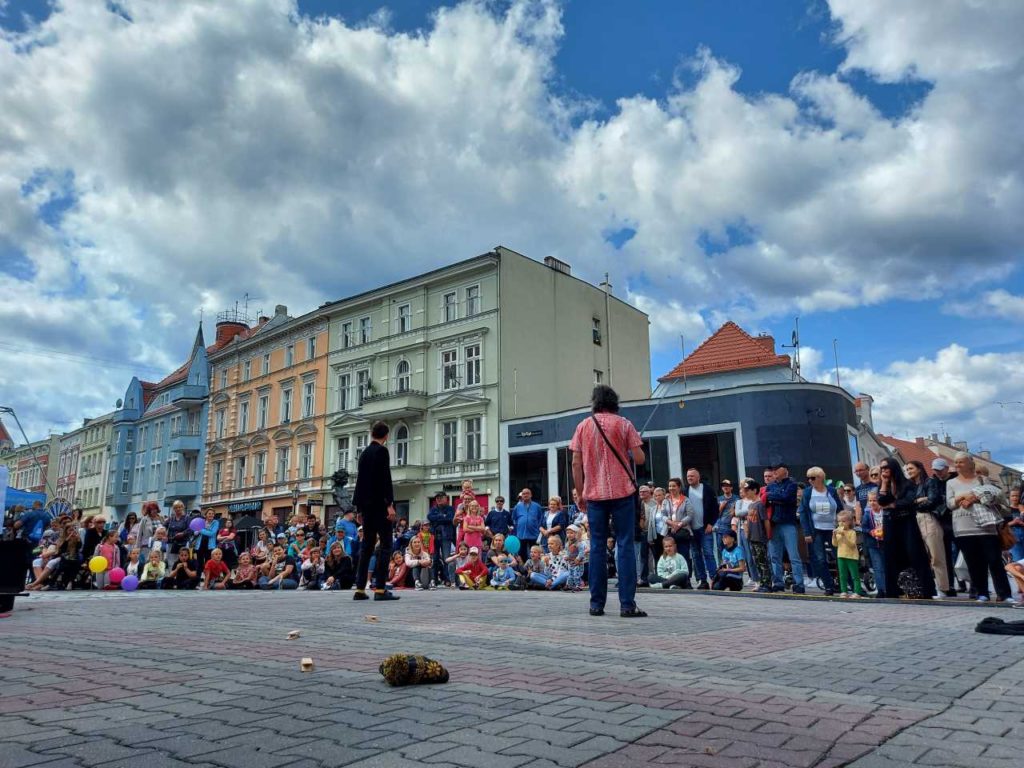
Do you remember your first street show?
I was really fortunate with my first busking show. A couple of amazing local performers in my hometown of Bournemouth gave me lots of advice and let me use their speaker, mic and rope and would even draw a crowd for me. I would then present tricks and would talk unplanned nonsense.
A lot of buskers might have the opinion that you should earn the crowd and ‘cut your teeth’ on the street but I may never have ended up as performer without this little act of kindness. I was really shy as a kid, didn’t particularly have a group of friends at school and having the validation from the audience really helped me grow in confidence as a performer and as a person.
Thank you Simon and Marky.
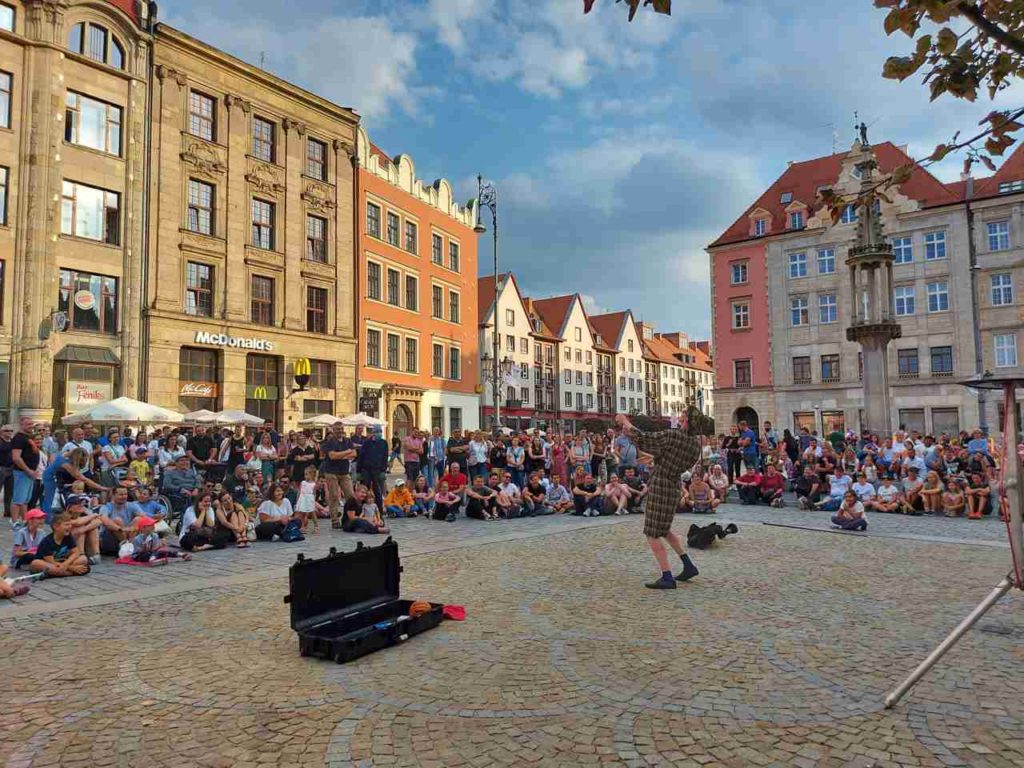
What have been your best crowd’s response and a terrifying moment?
January 2020 NoFit State Circus played the Roundhouse in London, an incredible 1000+ seater venue. One evening we had a show for press, promoters and circus people. The show was going really well, I felt really alive. In the second half, I unicycle across a line of upturned wine glasses, after I finish I walk into a spotlight centre stage and with the climax of the music put on my sunglasses as my last moment in the show. This night, however, the moment I put my sunglasses on one of the lenses popped out and fell on the floor, the laugh from the audience wasn’t huge but it was so genuine because everyone knew there was no way that could have been planned. I played with it and walked off stage giggling to myself. It was a beautiful shared joke between me and the audience that I had no control of.
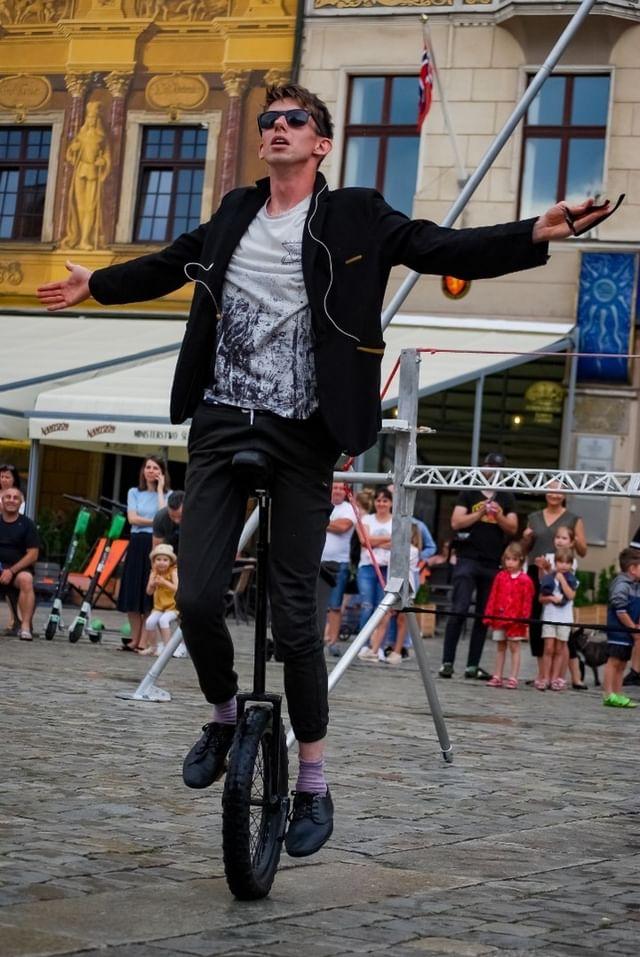
Using intrigue to build a crowd
How do you build the crowd?
When I travel without my tightwire I like playing with using intrigue to build a crowd rather than promise.
A common way for circus street performers to do a show is to promise what will happen by laying out their props and/or telling people what they will do in the finale and then they go through the routines one at a time and the audience always knows what’s coming next so that they won’t leave.
Silent clown style performers often use a different hook; they have no tricks and play with the flow of people and interesting characters that pass by. The audience builds and stays because of the unknown. What could possibly happen next?
I love being in the crowd watching these shows because even as a performer myself it really feels like anything could happen. At the moment I’m enjoying trying to use this structure to build a circus trick show, keep all the props hidden and hook the crowd with the unknown. When I have my tightwire though this is impossible cause I can’t hide the massive 6 foot metal structure behind me and things get a lot more simple because if I don’t use it until the end of the show people will gather and stay until I do.
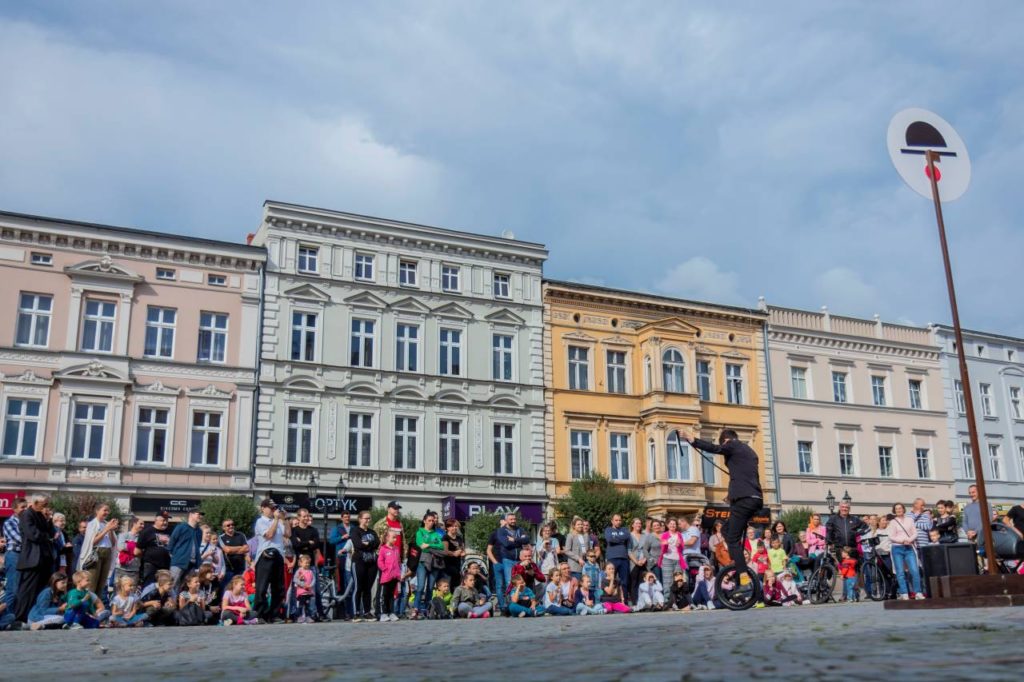
What are your favourite and the most challenging places to busk?
I generally enjoy going to a new country and seeing how they respond. The biggest challenge is always security and police, whether they dislike you being there or not. Sometimes it’s just the thought that I shouldn’t be there that gets in my head and then I can’t make the show work and don’t enjoy it because I’m expecting to be stopped.
What shows make you stop and stay in the street?
Shows from people who are living their show and performing material that feels real and fresh. Sometimes that means original tricks or jokes and sometimes it’s going up on a tall object, juggling dangerous objects and saying lines I’ve heard before. It depends on the person and if it feels authentic to them. The main thing is what the audience feels during the show and how special and unique the crowd perceives it to be when it’s happening.
Who are your favourite buskers and the best shows you have ever seen?
I like Fraser Hooper, a silent clown street performer. His boxing show is filled with comedy that has been crafted, refined and worked in A LOT – but still feels fresh and has room for play.
I like Pete Dobbing. He really learns a pitch and maximises the effectiveness of his show in that pitch. Often with huge well-controlled crowds, limited props, it’s honest, seemingly simple and joyous.
I like Karcocha. I performed with him recently at a festival in Portugal, watched his show and chatted with him after. I love the style of his show, the crowds get huge because they have no idea what he’ll do next and are always dying to let out their next laugh. He also had a really beautiful philosophy for performing and sometimes will do huge successful shows and not ask the crowd for money just to make some magic in people’s lives.
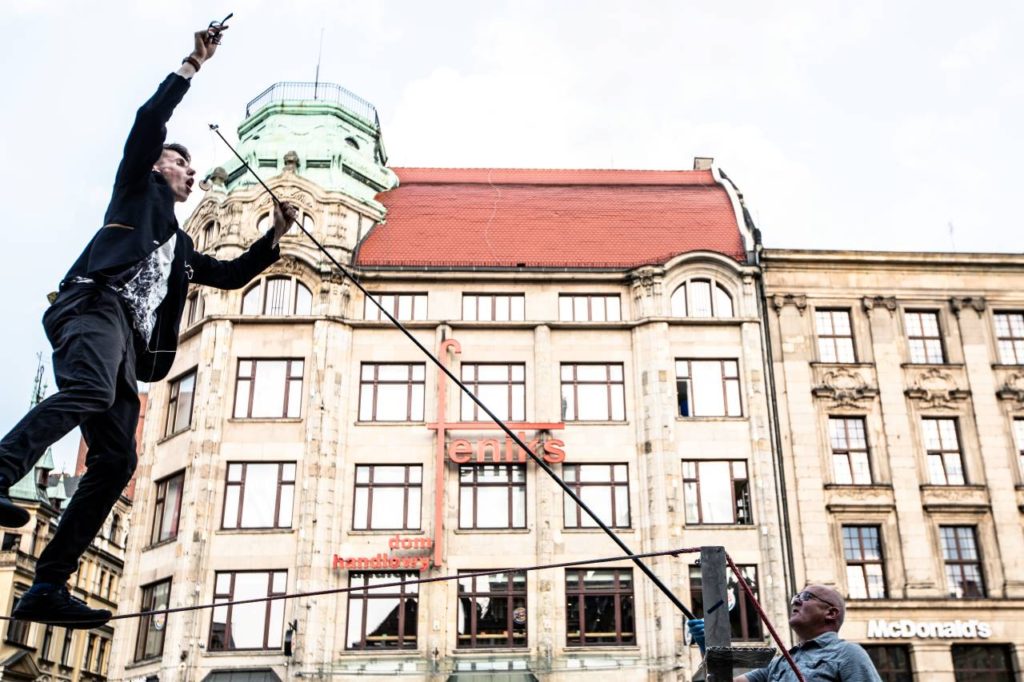
The public should be the judge
Do you think that busking should be regulated? If you had to decide, what would be the best busking rules?
My perspective is that busking is freedom of speech.
A government shouldn’t ban protests the same as they shouldn’t ban performance or expression in a public space. It’s a bad sign when there is a zero tolerance on busking in an area. I understand rules on different elements that sometimes come with busking, some areas shouldn’t have loud noise at certain times or all times. Some areas it’s a safety risk or annoyance for large crowds that aren’t controlled by the performer to completely block access. However, these things shouldn’t be used as a way to try to stop buskers for the sake of stopping buskers because it doesn’t fit a town’s aesthetic.
Overall the public should be the judge – if they aren’t good they won’t make enough money to keep doing it for long, or they’ll get good in time and adapt their set/show to fit the town.
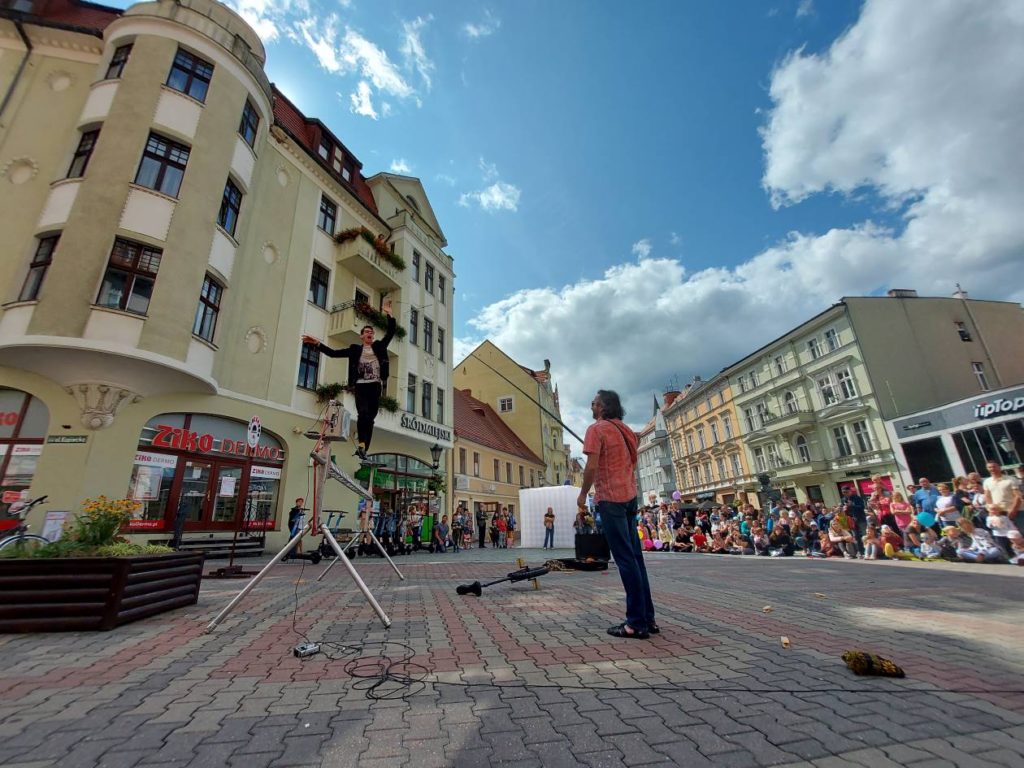
What tips do you have for new performers?
Imitating others can be a great tool to feel comfortable when trying to do shows for the first time on the street. It’s a super unnatural uncomfortable place when you first start, so don’t feel ashamed that your show isn’t original enough. Don’t get stuck there though – it’s much more likely that you’ll be successful in the long run performing something that authentically represents you.
If anyone tells you your ideas won’t work, don’t listen to them. The absolute best “format” to do a street show probably hasn’t even been done yet. Your way could be better than the way people in your town are doing it. Well, eventually, after lots and lots of trial and error.
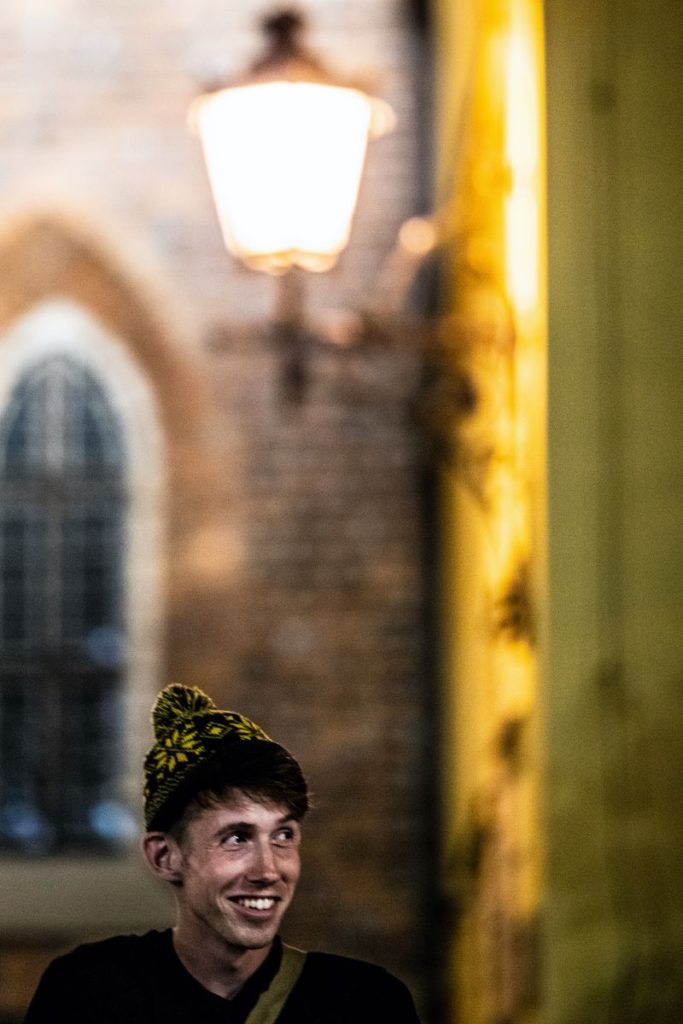
What are your plans and dreams, and what can I wish for you?
I often change my grand plan in my head but right now this is it: 1. A really nice street show I’m proud of and has enough variations to work absolutely anywhere anytime. 2. A solo circus tent show that all fits into just one van and trailer that I can do self-promoted shows with set up in small towns.
Both things I think are just about freedom: to make money when I decide to and to creatively be able to completely do my own ideas. Well, after lots of trial and error of the bad ideas and a few broken cookies.
Good luck! Thank you, Sam!
About Sam Goodburn
Sam Goodburn started initially as a unicyclist and first won the national freestyle unicycle championships when he was 15. Around the same time, he began his circus career street performing in small English towns. Since then, he has worked with contemporary and traditional circus, on cruise ships, in his solo theatre show at the Edinburgh Fringe Festival, and many more. In his shows, Sam combines character comedy with a range of self-taught technical skills, including a unicycle trick on a freestanding tightrope and juggling.
